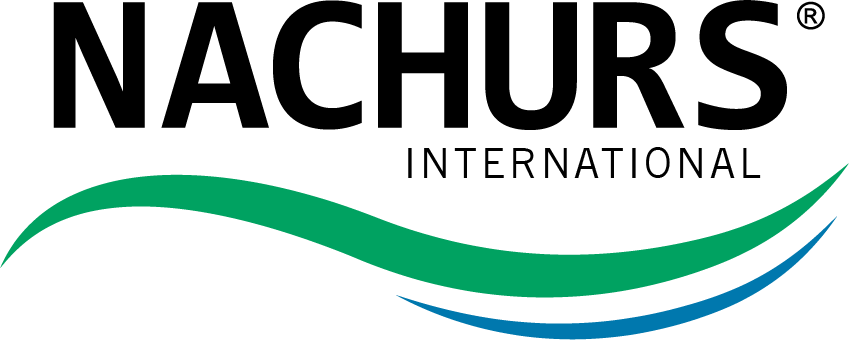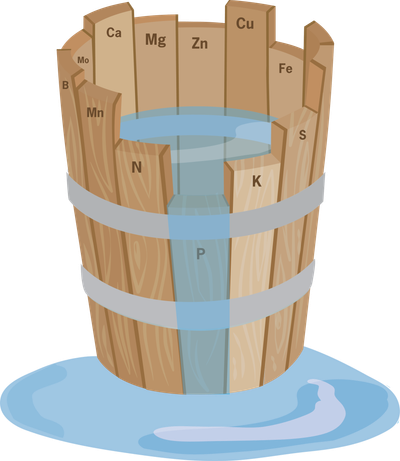
Micronutrient Products
Micronutrients
Micronutrients are essential to plant life but normally our soils contain enough to provide sufficient nutrition to the plant. NACHURS EDTA chelated micronutrients are 100% available to the crop.
Most growers are well aware of Liebig’s Law of the Minimum which states that any deficiency in a nutrient, no matter how small, will hold back the yield potential. As growers have evolved their crop nutrition programs to provide the maximum micronutrients to achieve optimum yields, it is often a micronutrient deficiency that is restricting the plant from reaching its genetic potential.
Growers must take into account the interactions of nutrients with each other. Any over supply on one nutrient can cause another nutrient to become the limiting factor.

The EDTA Difference
Unlike other micronutrient sources such as complexes, partial chelates, and natural organic complexes, NACHURS EDTA chelated micronutrients are 100% available to the crop by reducing soil immobilization by remaining water soluble. Other micro sources contain too little complexing agent and undergo major chemical changes, delivering significantly less micronutrient in a form available for plant uptake. While these sources of micronutrients may offer cost savings at first, they can actually create deficiencies for lack of availability.
What is a chelate?
A chelate is a complex organic molecule that surrounds the nutrient ion. Chelates are used as carriers for micronutrients, to keep them in solution and protect them from reactions that cause the micronutrient to become insoluble and unavailable to the plant.
- Chelation allows a nutrient to “maintain its own identity” with no tie up.
- Chelates are organic molecules that trap highly reactive metal cations (+).
- Chelation removes the positive charge from the metals.
- A neutral or slightly negatively charged chelated molecule enters the plant more rapidly.
The EDTA Difference
Zinc (Zn) - 100% EDTA Chelated
Zinc is necessary for starch formation and proper root development. It is also essential for seed formation and maturity. The most common Zn nutrient deficiency symptoms include interveinal chlorosis on older leaves with shortening of the internodal area. This shortening often results in a short compressed plant with a rosetted appearance. NACHURS P-Focus is formulated with Zinc.
Zinc is necessary for starch formation and proper root development. It is also essential for seed formation and maturity. The most common Zn nutrient deficiency symptoms include interveinal chlorosis on older leaves with shortening of the internodal area. This shortening often results in a short compressed plant with a rosetted appearance. NACHURS P-Focus is formulated with Zinc.
Manganese (Mn) - 100% EDTA Chelated
Manganese is essential to plants but too much is toxic. Manganese functions in chlorophyll development and serves as a catalyst in several enzyme systems in the oxidation-reduction process. Manganese deficiency symptoms are very similar to iron deficiencies and appear in the younger leaves of the plant first. Color may be pale between the veins of broadleaf plants. NACHURS N-Focus and K-Focus are formulated with Manganese.
Copper (Cu) - 100% EDTA Chelated
Copper is important as a co-enzyme. It is needed to activate several plant enzymes, including building and converting amino acids to proteins. Since Copper is an immobile nutrient in the plant, deficiency symptoms usually occur on new growth. Copper deficient plants will become chlorotic and take on a bleached appearance. New growth may die.
Magnesium (Mg) - 100% EDTA Chelated
Magnesium is important for ATP formation in chloroplast, as a structural part of chlorophyll, and activates numerous enzymes; most important being ribulose- 1, 5 - biphosphate carboxylase for photosynthetic carbon dioxide fixation. The typical deficiency symptom is interveinal chlorosis on older leaves.
Iron (Fe) - 100% HEDTA Chelated
Iron functions as a catalyst in several processes within the plant. It plays a vital role in the formation of chlorophyll and also functions in the respiratory enzymes. Iron serves in the transportation of energy in the plant. Iron is also an immobile nutrient and nutrient deficiencies are usually noticed first in the young leaves. They will first exhibit interveinal chlorosis which will spread over the entire leaf and turn the leaf white. New growth will cease and the leaves will die.
Calcium (Ca) - 100% EDTA Chelated
A secondary element in plant nutrition, calcium is needed in the plant to promote early root formation and growth. Improves general plant vigor and stiffness of stalk. With Calcium deficiencies, leaves have a wrinkled or crinkled appearance and, in some instances, young leaves may never unfold. Roots are also short and are very bunched.
Boron (B)
Boron is vital to the growth and development of the plant. Without adequate Boron, new growth ceases. It is necessary in the pollination and seed production stages. Boron is essential for maintaining a balance between sugars and starches. A small amount of Boron is beneficial to plants but too much can be toxic to plants. NACHURS N-Focus, K-Focus, and S-Focus are formulated with Boric acid.
All micronutrients are also available for purchase as standalone products.
*Taken from: Western Fertilizers Handbook
Need More Information?
Contact us today or click here to download our booklet of agronomic information

©
Copyright Nachurs Alpine Solutions